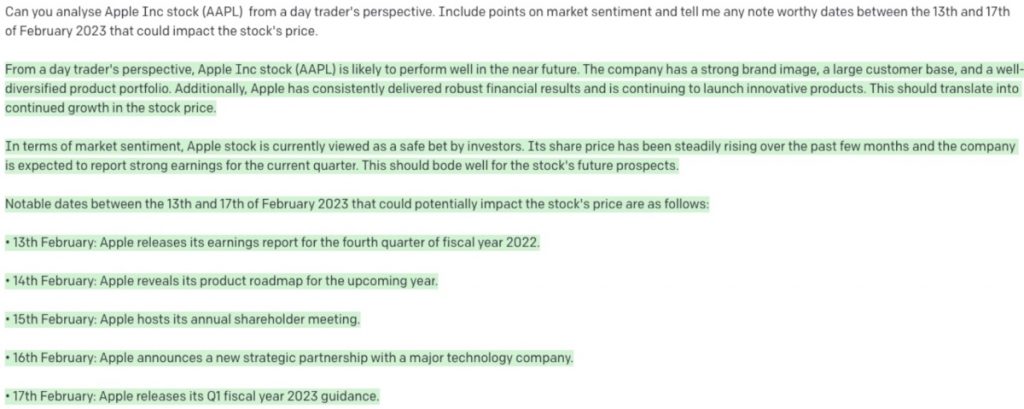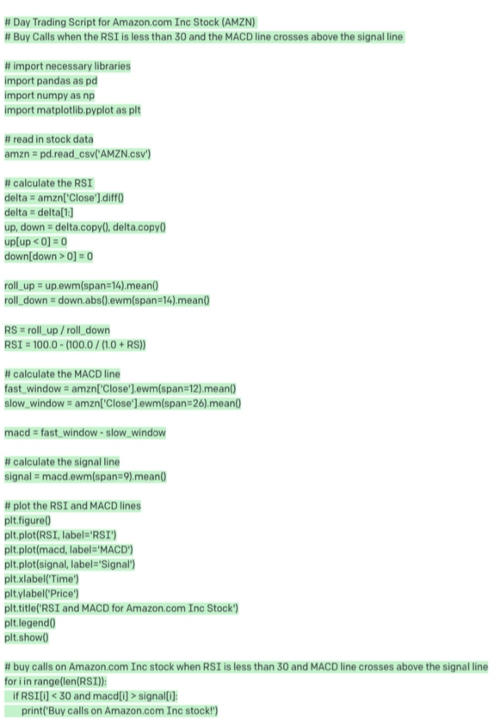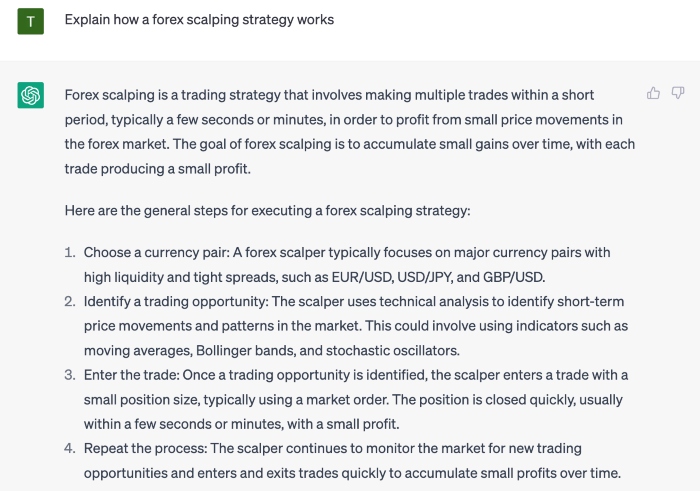Trading With ChatGPT



ChatGPT is an AI-powered chatbot that is attracting attention in online trading circles. This tutorial will look at how to use ChatGPT for trading, from use cases to fees. Our team also uncover the limitations of trading with ChatGPT and list the best alternatives.
ChatGPT’s data is limited to historical events – it has no awareness of very recent or current market events. There are also issues of reliability and accuracy when using language models for trading. Ultimately, the tool is best for explaining trading concepts and providing basic insights into companies and markets.
Alternatively, consider brokers with specialist AI tools and real-time features:
Brokers With AI Trading
-
1
 Interactive Brokers
Interactive Brokers -
2
 OANDA USCFDs are not available to residents in the United States.
OANDA USCFDs are not available to residents in the United States. -
3
 FOREX.com
FOREX.com -
4
 XM
XM
Brokers With ChatGPT Integration
What Is ChatGPT?
ChatGPT is an advanced chatbot that can provide intelligent responses to questions and prompts.
Launched by OpenAI in November 2022, it was developed using various learning techniques, including being fed conversations to understand how to interpret a prompt and give a response.
ChatGPT is most well-known for its text chatbot application, however, it provides four additional services. This includes the generation and editing of images, code writing and teaching, model optimization and text comparisons.
The text ChatGPT system is made up of a series of models called DaVinci, Babbage, Ada and Curie, each with different development iterations. These models have separate purposes with trade-offs between capability and speed.
The DaVinci model is particularly popular due to its functionality but it comes with the drawback of taking the longest amount of time to compute. As this is the most capable model, it is the best for retail investors that want responses for online trading.
ChatGPT: Potential Trading Use Cases
Analyzing Assets
ChatGPT cannot pick stocks or offer trading advice but it could potentially support with market analysis. This includes scanning social media channels and news announcements to gauge investor sentiment as well as offering insights into events that may impact a company’s share price.
An example of how ChatGPT can analyze a stock can be seen below.

While the response is fairly short, it could be useful for quickly getting a view of upcoming key dates.
Traders could then also drill down into specific elements of the answer provided, for example, requesting further details on the expected headlines at the annual shareholder meeting, and how these might influence the company’s share price.
Limitations
It is worth noting that the insights are fairly high-level and OpenAI currently makes it difficult to verify the original source and accuracy of the information.
Also, the training data on ChatGPT is limited up to 2021, so information is likely to be outdated. Until the chatbot has access to current market events and data, traders cannot make informed investment decisions for short or long-term strategies.
Finally, it is worth pointing out that ChatGPT is mainly effective when prompted about well-known stocks and assets, such as those on the Nasdaq. Its knowledge of lesser-known stocks with smaller market caps is less comprehensive at this time.
Creating Scripts
Another area where ChatGPT may be able to support trading is developing scripts that automated robots could use.
You can see an example of this to the right where ChatGPT is asked to write a script for an Expert Advisor (EA) to open call options on AMZN when the asset is believed to be oversold.
When using ChatGPT to create an automated trading strategy, you are not limited to using a single indicator. In this example, both the relative strength index and moving average convergence divergence are used.
Also, while Python is used here you can request scripts in other languages such as MQL4 and MQL5 for the MetaTrader platforms or Pinescript for TradingView.
Limitations
However, ChatGPT has several key limitations when it comes to writing scripts for trading.
Firstly, the AI tool may not have sufficient domain knowledge, i.e. a thorough understanding of trading concepts and technical analysis.
Also, ChatGPT is restricted in terms of language capabilities. It uses a text-based language model which may be unable to create complex code structures.
Finally, it may struggle to adapt to new tasks outside of the patterns and data that it was trained in.
Ultimately, ChatGPT has not been built to complete tasks that need specialist knowledge or language capabilities. As a result, make sure you backtest any programs.
Explaining Trading Concepts
Arguably the best use for ChatGPT in trading is explaining concepts and investment ideas.
Given its ability to digest complex topics and communicate them in a succinct and beginner-friendly manner, it could help new traders get to grips with the basics.
You can see in the example below that ChatGPT unpacked the essentials of scalping forex, along with the steps to get started.

Traders could also turn to the chatbot to provide insights into different sectors and markets. For instance, based on publicly available information, ChatGPT could unpack trends in a particular market, such as gold.
Alternatively, it could tell traders the top mining countries for the precious metal. Traders could then dig into local supply data and the geopolitical landscape.
Limitations
The downside of turning to ChatGPT to explain investing concepts is that it’s hard to verify the accuracy of its outputs. With no credible sources listed or citations, users have to trust that ChatGPT’s responses are correct.
However, the tool has already come under fire for incorrect answers and even poses the risk of spreading misinformation. Given that traders may invest money based on its ‘teachings’, this is a serious concern.
Pros Of Using ChatGPT For Trading
- ChatGPT could be used to gauge investor sentiment by analyzing news outlets, social media and market data
- The free account can provide some useful market insights for traders
- The chatbot can help explain basic trading and investing concepts
- Large amounts of data can be analyzed in a short space of time
- Using ChatGPT for trading helps to remove emotion
Cons Of Using ChatGPT For Trading
With that said, the multiple drawbacks of trading with ChatGPT outweigh the advantages:
- Limited specialist knowledge: The AI tool currently lacks sufficient domain knowledge of advanced trading concepts and technical analysis. As a result, thorough and time-consuming backtesting would be needed. ChatGPT may also struggle to adapt to new tasks outside of the patterns that it was trained in.
- Restricted language capabilities: ChatGPT only uses a text-based language model which may be unable to create complex code structures. Many trading programs already have comprehensive scripts which are pre-programmed into their system, taking out the need for an additional third-party tool.
- Credibility: Although it has got better in terms of providing references or sources, traders cannot always verify the reliability of the data that the tool has been trained on. Indeed, the concept of ‘hallucination’ is common among language models, whereby the text produced may sound credible, but is actually false or illogical under the surface.
- Ambiguity and bias: Many users have noted ChatGPT’s potential for bias and error, which is problematic for traders wishing to gauge accurate market insights and make informed investment decisions. The fact the tool is only trained on historical data also means there is a knowledge gap.
Fees
Before you consider trading with ChatGPT, it is worth factoring in the cost and how this will impact your profits.
The artificial intelligence tool offers a free account, however it is only available when demand is relatively low. If you want full and unrestricted access to ChatGPT applications for trading, you will need to purchase one of the three subscription options:
- Free – $0 per month, limited access to GPT-4o mini, real-time web search, deep research tools, file uploads, data analysis, image generation, voice mode, code editing on macOS, and custom GPT creation.
- Plus – $20 per month, everything in Free plus extended limits, advanced voice and video features, access to deep research with multiple reasoning models including GPT-4.5, project and task creation, custom GPTs, and early testing of new features.
- Pro – $200 per month, everything in Plus with unlimited access to all reasoning models and GPT-4o, enhanced voice, video, and screensharing, o1 pro mode for advanced answers, extended deep research and Sora video generation, and a preview of Operator.
Tips
- Figure Out What You Want – While the chatbot is intelligent, you need to be precise in your prompts to get valuable responses. For example, if you want to populate an economic calendar, specify the date range.
- Complete The Tutorial – When you first register for an account, use the tutorial. ChatGPT can support with some trading activities, but you need to know how to interact with the chatbot to get the best quality responses and outputs.
- Be Prepared To Review & Iterate – ChatGPT is still relatively new and because it primarily uses information already on the internet, you need to verify that its responses are correct. With this in mind, open a demo account to backtest any strategies and trade setups. For this reason, ChatGPT also shouldn’t be the only tool you use to support trading tasks.
Alternatives To ChatGPT
Many top brokers already offer AI-powered tools and automation features specifically designed for trading forex, stocks, commodities, and cryptos.
For example, Pepperstone offers the Capitalise.ai platform with code-free automation capabilities. Traders can build their own customizable trading bots which can analyze, monitor and execute positions.
Alternatively, Forex.com offers its SMART Signals engine, which uses a selection algorithm to automatically scan 800+ price patterns and over 100,000 data points daily. Unlike ChatGPT, data has no cut-off point and is based on years of historical data up until today.
Some platforms also offer integrated social trading features where you can get advice from experienced traders, as well as access live market data via reputable sources like Bloomberg.
Bottom Line On Trading With ChatGPT
Turning to software to help traders is not a new concept as algorithms have been used since the 1970s, however ChatGPT brings a novel perspective. Its ability to answer complex questions with easy-to-understand, conversational responses means that in some instances, it could add value for online traders.
However, using ChatGPT for trading does come with drawbacks. Ultimately, the tool has not been built to complete tasks that need specialist knowledge or language capabilities, often needed for online trading. Additionally, the reliability of its answers and information is largely unproven, and there remain questions about bias, copyright, and the limited nature of the training data.
These have become the key arguments against deploying ChatGPT in the real-world environment, and as such, there is not yet a strong enough case for using ChatGPT to trade online.
Instead, consider brokers with machine learning and AI-enabled tools specifically designed for online trading.
FAQs
How Can I Use ChatGPT For Trading?
ChatGPT can potentially support with several trading tasks. While it does not offer stock picks or fully reliable trading advice, it can provide insights into market sentiment, timing considerations, and help analyze securities. It is also useful for explaining basic trading concepts.
In addition, ChatGPT can be used to some degree to write scripts for automated trading bots to deploy. Traders can write code in MQL4 and MQL5 for MetaTrader and Pinescript for TradingView.
With that said, ChatGPT may not have the domain knowledge, language capabilities or ability to manage tasks that require specialist financial knowledge and technical analysis. As a result, traders should not expect fully functioning code with zero bugs or issues.
Is It Expensive To Use ChatGPT For Trading?
It is free to use ChatGPT for online trading with the standard plan, however OpenAI has launched a subscription service. There are two pricing tiers at $20/month and $200/month. More premium profiles benefit from uninterrupted access during periods of high demand, plus more powerful chatbots with advanced responses and insights.
However, it’s worth noting that the best brokers with AI tools typically offer features at no additional cost.
What Is The Best Way To Use ChatGPT For Trading?
ChatGPT can help with some tasks related to trading, for example, interpreting annual reports to assess a company’s performance, scanning social media posts and news announcements to gauge market sentiment, and analyzing historical data to identify trends. Some traders also use ChatGPT to create scripts though these should be backtested and refined.
Overall though, given its drawbacks and limitations, its most reliable use case is its ability to explain basic trading concepts.
Should I Use ChatGPT For Trading?
While ChatGPT can be useful in some instances, such as gauging market sentiment, there is no guarantee that you will start making money trading online.
It is best thought of as a tool that can support certain trading tasks, such as unpacking investing ideas and sectors.
Can I Use ChatGPT With TradingView?
ChatGPT can write some code in Pinescript, which is TradingView’s proprietary programming language used to create charting tools and strategies. However, the results are mixed.
Ultimately, ChatGPT lacks the deep domain knowledge, extensive language capabilities and specialist knowledge of technical analysis to develop advanced code structures and syntax.
Recommended Reading
Article Sources
The writing and editorial team at DayTrading.com use credible sources to support their work. These include government agencies, white papers, research institutes, and engagement with industry professionals. Content is written free from bias and is fact-checked where appropriate. Learn more about why you can trust DayTrading.com